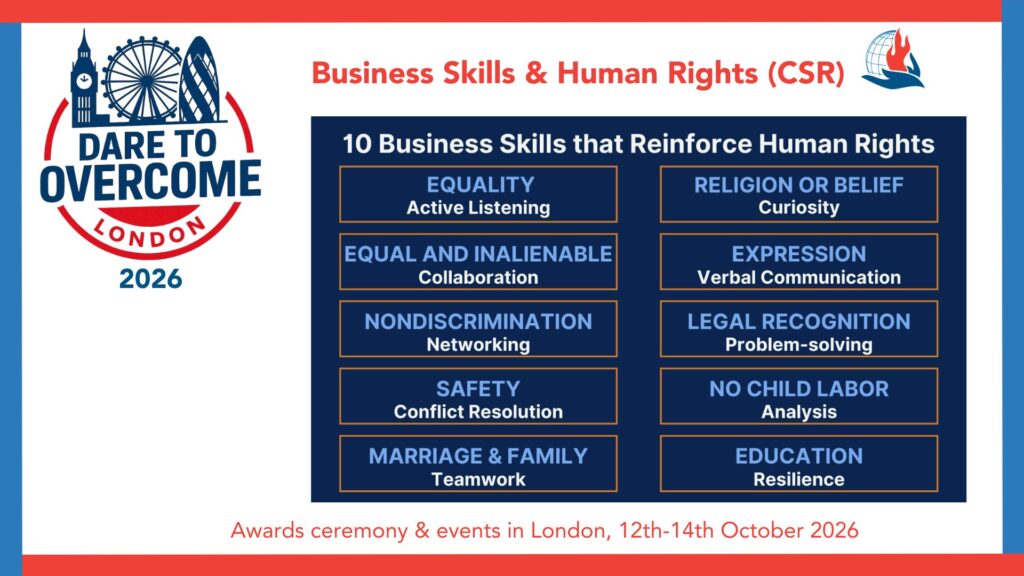
Link to India-adapted curriculum.
Link to India-adapted activities.
Link to Lesson 1 (for use globally).
The curriculum teaches soft business skills that both reinforce human rights knowledge and promote inclusive peace. The curriculum has ten 30-to-60-minute lessons on ten distinct human rights and associated business skills. The aim is to have Corporate Social Responsibility (CSR) initiatives from local companies fund its ongoing development. Regional stakeholders will be responsible for securing corporate CSR sponsorship.
One of the outcomes of Dare to Overcome 2023 was that the Office of the Principle Scientific Advisor to the Government of India invited Dare to Overcome to curate Sustainable Development Goal (SDG) 16 — Peace, Justice & Strong Institutions — on their Manthan platform.
Through this platform and in partnership with others, Dare to Overcome will initiate and promote Corporate Social Responsibility (CSR) initiatives addressing SDG 16, beginning with piloting the Dare to Overcome Human Rights, Business Skills & Peace Secondary School Curriculum described below.
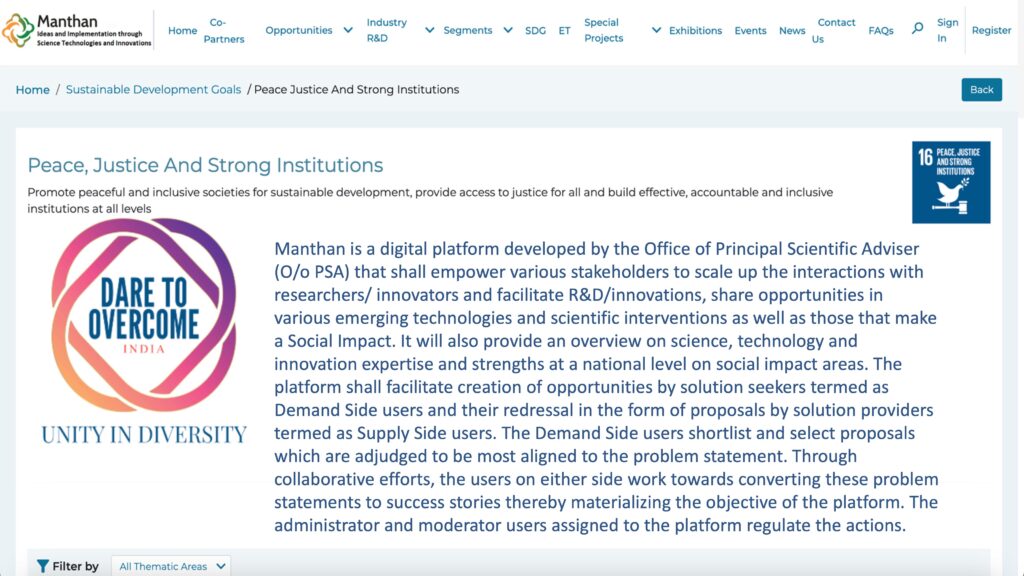
SDG 16 aims to promote peaceful and inclusive societies for sustainable development, provide access to justice for all and build effective, accountable and inclusive institutions at all levels.
Dare to Overcome supports this through several initiatives, including its awards to business leaders advancing SDG 16 as well as its annual conference in New Delhi which celebrates successes in inclusive business practices that build peace and prosperity. Our mantra ‘Unity in Diversity’ calls businesses to not only put this to practice in their workplaces, but also in Corporate Social Responsibility (CSR) initiatives that promote the same values among the coming generation’s workforce. Indeed, India is the global leader in CSR, thanks to the Enactment of Companies Act, 2013.
Pilot of the Curriculum (see Lesson 1)
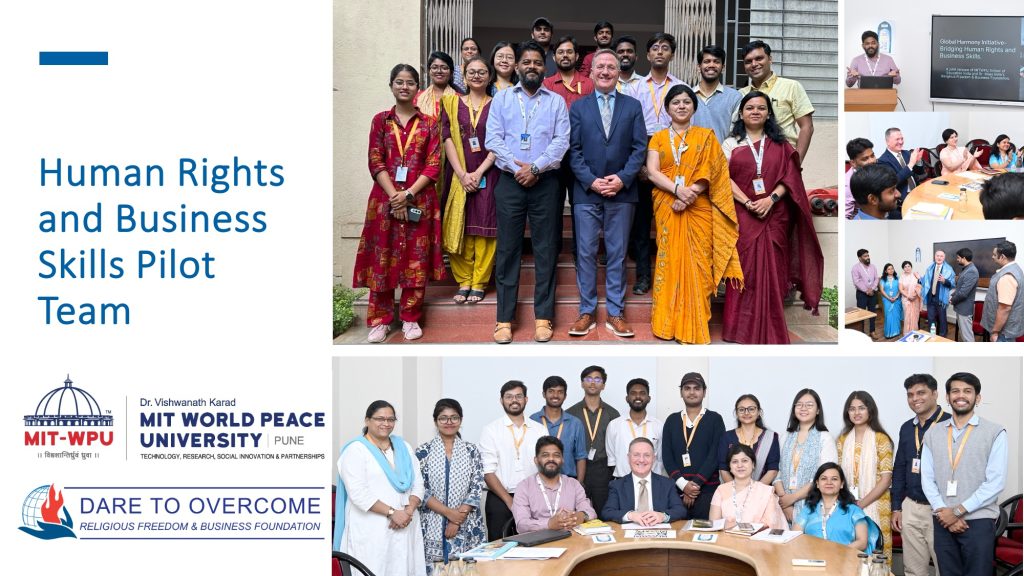
Roundtable
MIT World Peace University School of Education professors and student teachers kicked off the week with a roundtable demonstrating how they adapted the curriculum to the Indian context and piloted the curriculum (see the picture above). The professors include the department head Dr Shalini Tonpe, Asst Prof Rahul Landge and Asst Prof Priya Kale.
The Roundtable conference began with Asst Prof Rahul Landge, in the picture below, reading a comprehensive report on the implementation of human rights curriculum, which was piloted across different schools of Pune city. The report provided valuable insights into curriculum’s execution, identified opportunities for growth, highlighted the challenges encountered, and included series of accountable recommendations for enhancing future efforts. This review played a crucial role in assessing the curriculum impact its adaptability within diverse educational settings.
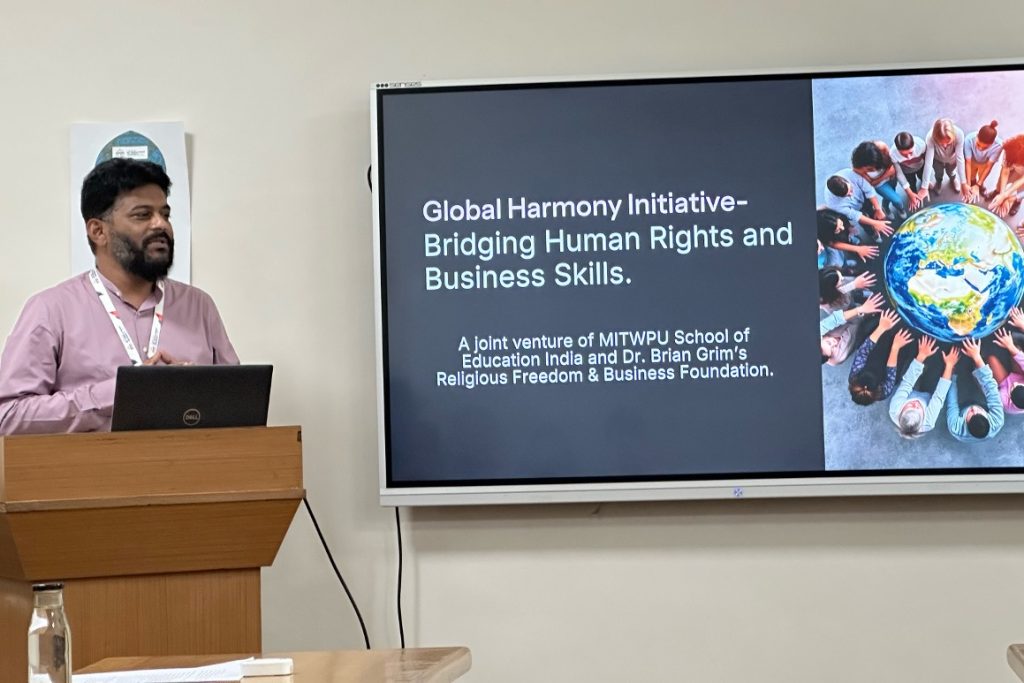
The human rights were very well received, and each of the 10 school principals were especially attracted to the practical business skills tied to higher values. Asst Prof Priya Kale, in the photo below, shows that while none of the schools has a business skills curriculum and only four are aware of such a curriculum, they all would like to implement such a curriculum in their schools.
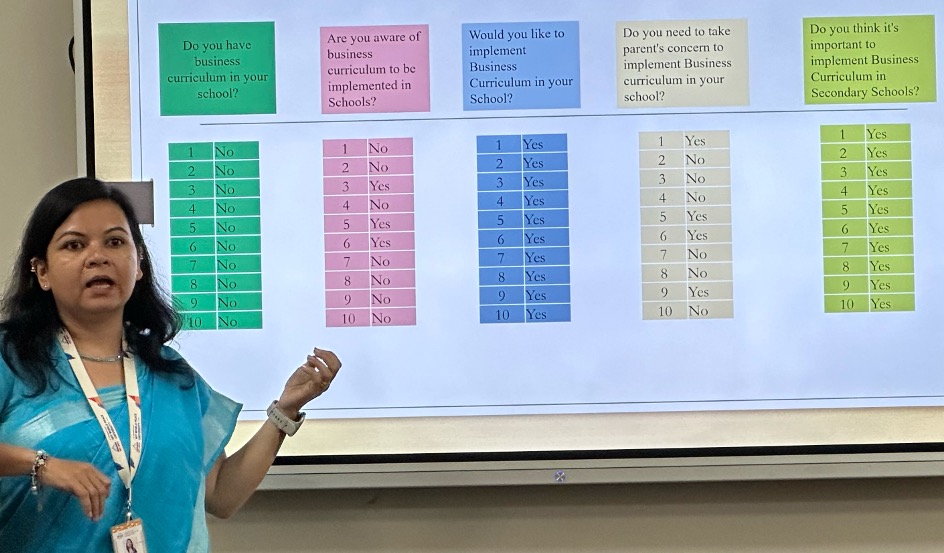
The team’s student teachers demonstrated as part of the roundtable four of the 10 human rights lessons that they piloted in the fall: Freedom of Religion, Protection from Child Labor, Right to Marriage and Family, and Freedom from Bullying.
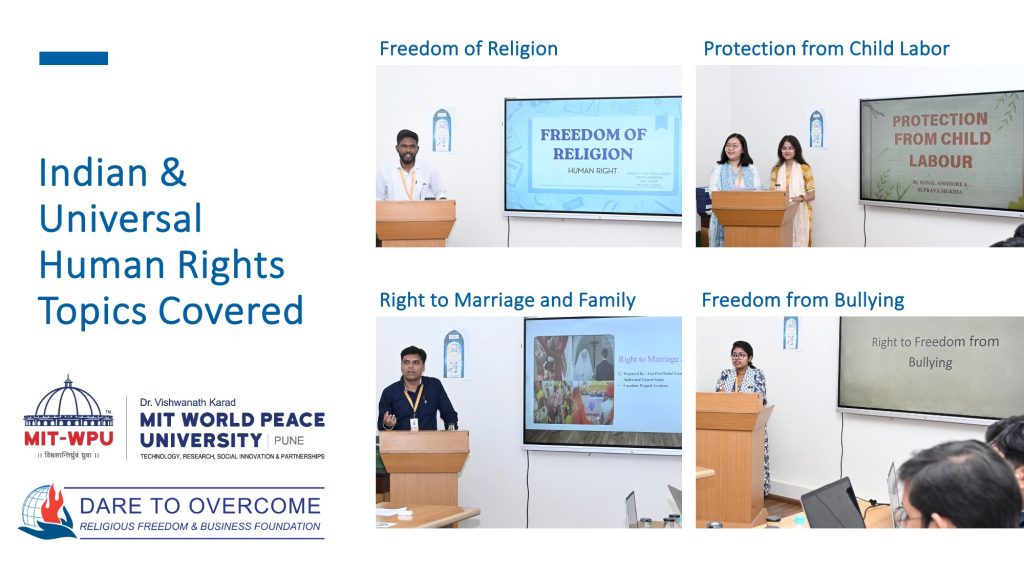
In the Schools
The class teacher at Anjuman Islam Peer Mohamed High School – Pune, an all-girls Muslim school (pictured below, bottom right), gave a ringing endorsement after the demonstration lesson, Freedom from Bullying. She and the chief school administrator invited us to implement the curriculum on an ongoing basis.
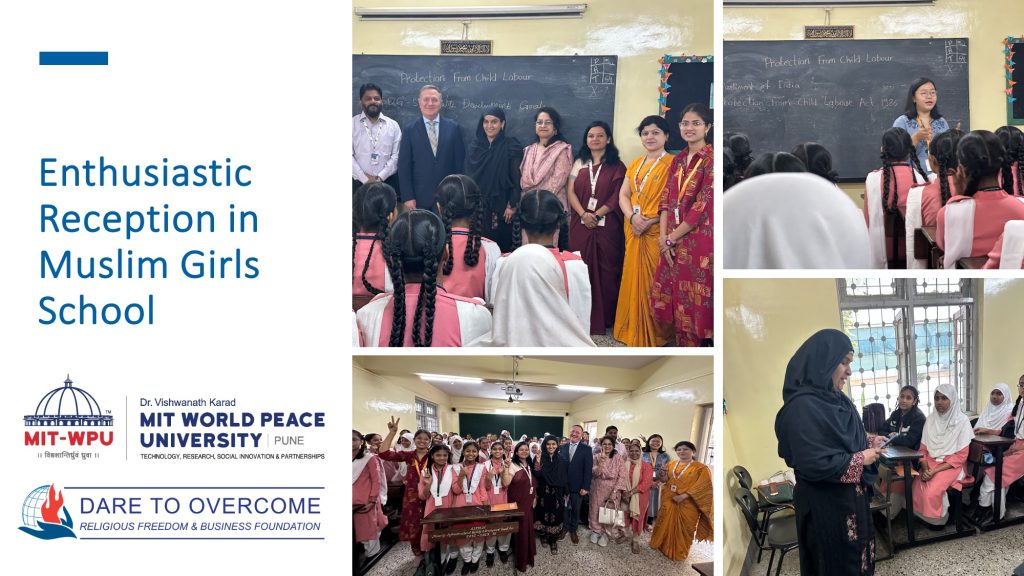
At a Punbe school for underprivileged students, the Bharati Vidyapeet School, the pilot was on the fundamental human right to Marriage and Family. The class was executed effectively, with a variety of engaging activities designed to raise awareness about this right. Students actively participated in role-playing exercises, group discussions and case studies, which helped them explore marriage laws, family dynamics and personal freedoms.
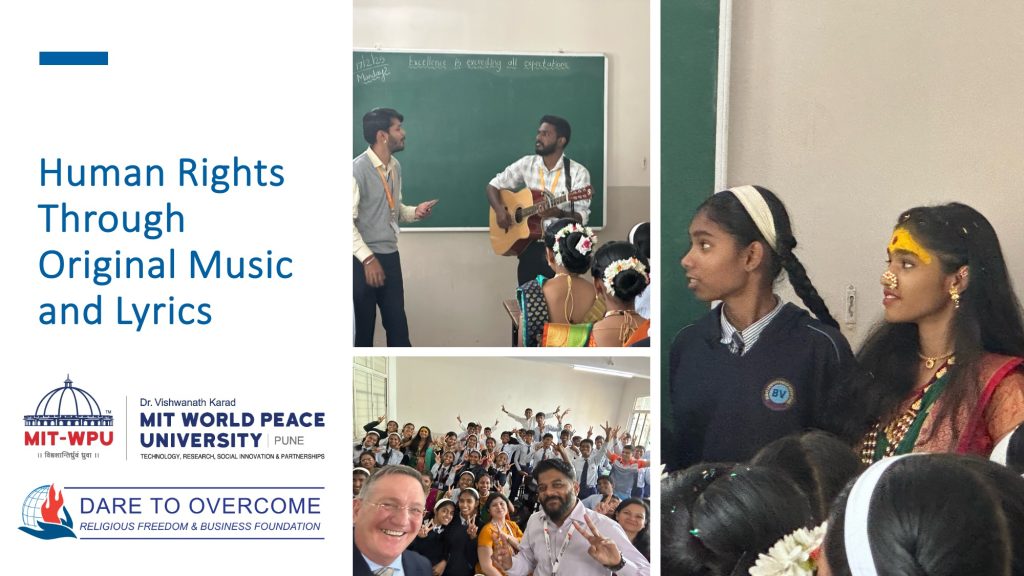
A highlight was the performance of one of the 10 original songs written by one of the Hindu student teachers. He partnered with a Christian student teacher (both pictured below) to write the songs to go with each of the 10 lessons.
At a prep school attached to MIT WPU, the pilot class on Religious Freedom was animated through “gamification” – using games and competition to motivate learning. In one game, teams competed to see who could find the most similarities between India’s multiple religions. My minor but really fun part was to come on stage and hand out the awards.
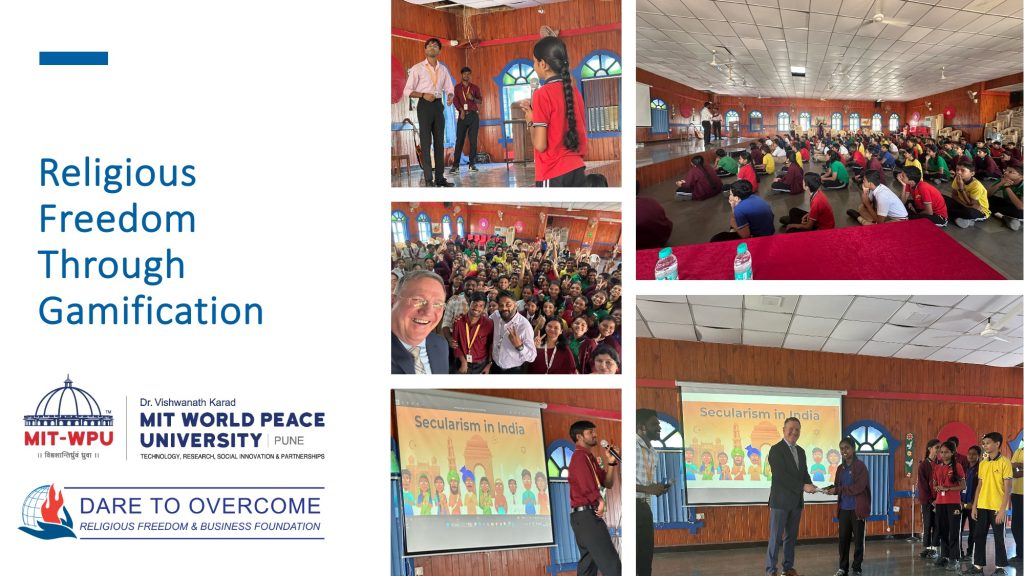
The final demonstration pilot was at a tutoring center giving evening classes for underprivileged students. The center is an act of love by a husband and wife team who offer daily coaching classes on English and math as well as other subjects as needed. The lesson was one that hits close to home for these students: Freedom from Bullying.
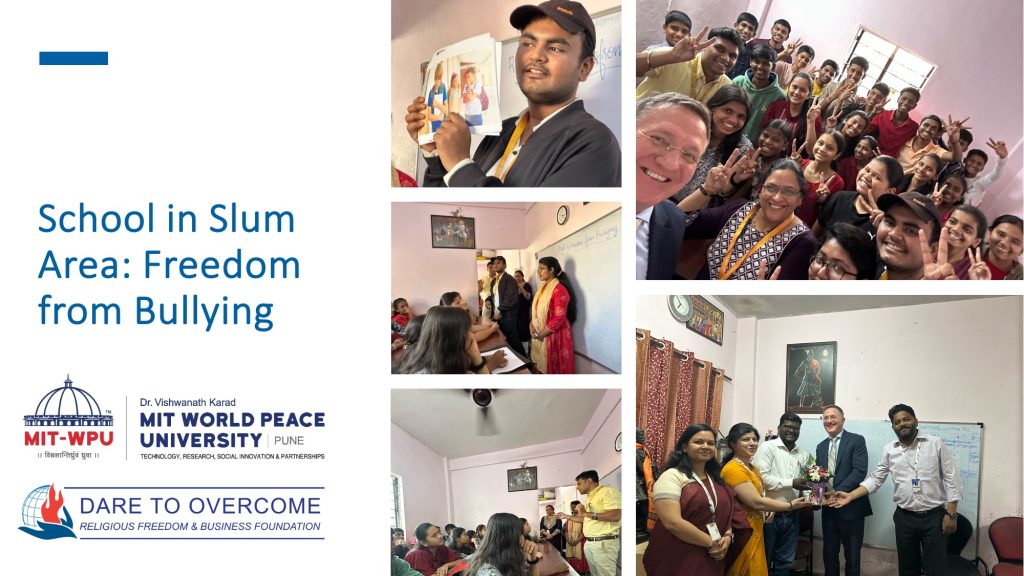
The Impact and Next Steps
Comments from students ranged from, “I didn’t realize we had universal rights at birth,” to coming up for strategies on how to combat discrimination.
We are working towards sustainability and expansion of the initiative across India and worldwide through Corporate Social Responsibility (CSR) funding. Indian companies must spend a minimum of 2% of their average net profit over the preceding three years on CSR activities.
In recognition of the leadership making this pilot possible, we will be conferring the Global Business & Interfaith Peace Gold Medal to MIT-WPU’s Executive President, Dr. Rahul V. Karad (pictured below, center). The award will take place during our upcoming Dare to Overcome conference in Washington DC on May 20-22, 2025.
I made the announcement of this prestigious award during MIT-WPU’s Executive Board meeting. Also present was the founder, Revered Prof (Dr.) Vishwanath D. Karad. He established the university’s guiding principle based on the teachings of India’s Noble Son Swami Vivekananda, “The union of science and spirituality will bring peace and harmony to mankind.”
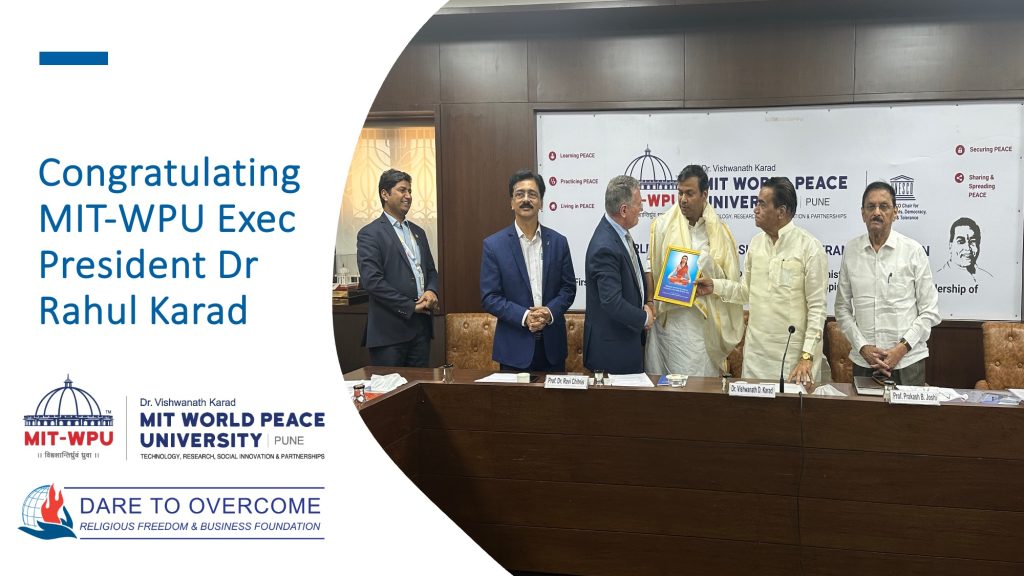
To learn more, contact DTO Chair Dr. Brian Grim.

